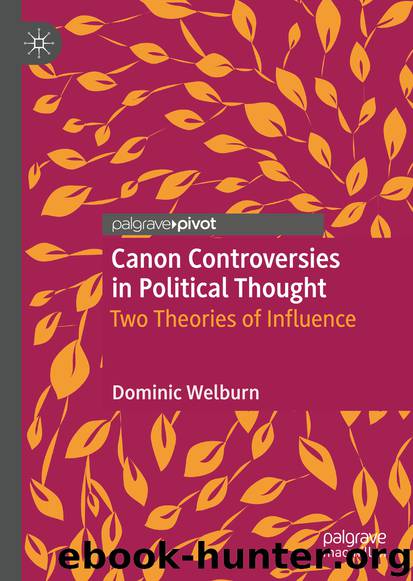Canon Controversies in Political Thought by Dominic Welburn

Author:Dominic Welburn
Language: eng
Format: epub
ISBN: 9783030413613
Publisher: Springer International Publishing
Mandelbaum ’s concern is with the ‘independence’ of authors’ ideas, and their agency, but not the category of influence per se. It remains difficult to discount the value of influence, however, if we again view the ‘independence’ (or originality) of a thinker as only the negation of influence, and an overcoming of the bounds of a tradition or canon of thinkers. That is, an individual is said to be original when they have broken free of their all-powerful predecessors. As with literary studies, such a link is only maintained if influence and originality are viewed as being synonymous with power. An overview of the critique of influence in twentieth century political thought, particularly within the works of R. G. Collingwood, Quentin Skinner, and Conal Condren, demonstrates a near parallel concern with the relationship between influence, originality, canonicity and tradition in literary studies but only in the methodological, as opposed to the political, sense. Calls made by these leading historians of political thought to reform and extend the traditional Western canon were based on a historically-minded approach to method, and a focus on context, as opposed to any of the external political values such as democracy, inclusiveness, and equality that motivated similar debates in literary theory.
Much like Mandelbaum, R. G. Collingwood’s idea of ‘re-enactment’ displays an enmity to a Lovejoyan theory of unit-ideas in stating that it ‘is so futile when influences are conceived as the decanting of ready-made thoughts out of one mind into another’.7 Collingwood states that a more suitable, ‘intelligent’ approach to this category would involve, for example, considering ‘the influence of Socrates on Plato, or Descartes on Newton … to discover not the points of agreement, but the way in which the conclusions reached by one thinker give rise to the problems for the next’.8 A theory of re-enactment was integral to Collingwood’s aphorism that ‘(a)ll history is the history of thought.’9 Re-enactment rejects ‘methods of modern historical enquiry (that) have grown up under the shadow of their older sister, the method of natural science’. His The Idea of History sought ‘to engage in a running fight with what may be called a positivistic conception, or rather misconception, of history, as the successive events lying in the dead past, events to be understood as a scientist understands natural events’.10 Rather, argues Collingwood, ‘history is nothing but the re-enactment of past thought in the historian’s mind.’ Re-enacting the thoughts of past thinkers is to understand both the ‘inside’ and the ‘outside’ components of events: ‘the object to be discovered’, for historians, ‘is not the mere event, but the thought expressed in it.’11 For example, if a ‘historian asks ‘Why did Brutus stab Caesar?’ they mean to discover the internal thoughts at work so as to instead enquire: ‘What did Brutus think, which made him stab Caesar?’12 Reenacting the thoughts of past thinkers is not the ‘passive surrender’, or banal decanting of the dead, past thoughts of the influential into the influenced but rather a critical enterprise whereby the
Download
This site does not store any files on its server. We only index and link to content provided by other sites. Please contact the content providers to delete copyright contents if any and email us, we'll remove relevant links or contents immediately.
4 3 2 1: A Novel by Paul Auster(12375)
The handmaid's tale by Margaret Atwood(7757)
Giovanni's Room by James Baldwin(7326)
Asking the Right Questions: A Guide to Critical Thinking by M. Neil Browne & Stuart M. Keeley(5757)
Big Magic: Creative Living Beyond Fear by Elizabeth Gilbert(5754)
Ego Is the Enemy by Ryan Holiday(5413)
The Body: A Guide for Occupants by Bill Bryson(5080)
On Writing A Memoir of the Craft by Stephen King(4935)
Ken Follett - World without end by Ken Follett(4723)
Adulting by Kelly Williams Brown(4565)
Bluets by Maggie Nelson(4547)
Eat That Frog! by Brian Tracy(4525)
Guilty Pleasures by Laurell K Hamilton(4439)
The Poetry of Pablo Neruda by Pablo Neruda(4097)
Alive: The Story of the Andes Survivors by Piers Paul Read(4018)
White Noise - A Novel by Don DeLillo(4002)
Fingerprints of the Gods by Graham Hancock(3996)
The Book of Joy by Dalai Lama(3976)
The Bookshop by Penelope Fitzgerald(3844)
